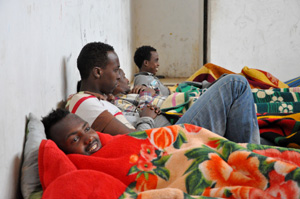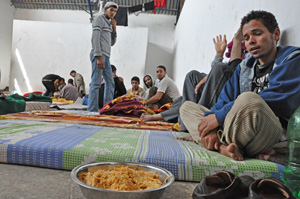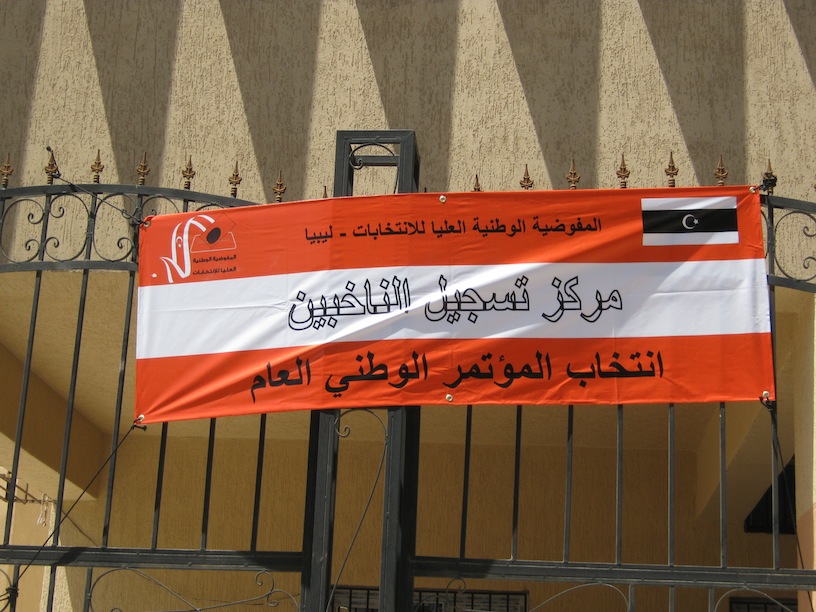Benghazi, 3 May (IRIN):

In one of the many rooms where detainees are held at Ganfouda detention centre in Libya’s . . .[restrict]second largest city, Benghazi, Suleiman Mansour*, a young Somali from Mogadishu, spends his days locked up along with 15 other migrants. They lie on mattresses propped against the walls, which are scribbled with names and slogans: one says “I love Somalia”.
“I’ve been here for four months,” Mansour told IRIN. “I left Mogadishu in August last year and was arrested in Kufra before they brought me here. Some of us have documents, but they are still being kept in Kufra.” The desert town of Kufra, lies at a point where the borders of Egypt, Chad and Sudan meet.
In another room, 36 men, mainly Egyptians, occupy one room. “We were in Libya even before the revolution, but afterwards, people with and without documents were rounded up,” said one who used to work as a cook in Benghazi before he was detained. Benghazi was a key stronghold of the opposition forces that toppled Muammar Qaddafi’s regime in 2011.
During Libya’s uprising, a number of sub-Saharan African migrants were accused of working as mercenaries for Qaddafi. In the absence of any formal justice system, with militia groups in control of large areas of the country, and with anti-African sentiment pervasive in Libya, many were beaten and detained.
The authorities at Ganfouda say the migrants currently being held were not accused of being mercenaries, but were locked up for having no documents, or expired papers and fake visas. There are around 400 people in the centre, including 150 Somalis, 100 Bangladeshis and others from Sudan, Egypt, Syria, Nigeria, Ghana, Ethiopia and Eritrea.
The conditions are harsh. Garbage lies scattered in the hallways of one of the buildings; detainees eat, sleep and use the toilet all in the same room. The food, which authorities say is provided three times a day, consists of one large bowl of spaghetti shared between groups of five people.
“The policy that they are applying is to round people up whether here in Benghazi or in Kufra and to put them in detention, sometimes even up to 1,800 people, that the centre cannot cope with it,” Yolande Ditewig, the head of the UN refugee agency (UNHCR) sub-office in Benghazi told IRIN. “By putting people in detention, you create a humanitarian situation if you don’t have the funds to take care of people. Many countries put migrants in detention, but here there are no facilities to provide for them, for the food and bringing the sanitation up to standards.”
The number of detention centres before the uprising was estimated at between 18 and 24 according to Samuel Cheung, Senior Protection Officer for UNHCR. Current figures are unknown. The Ganfouda authorities complained that the government is not providing any assistance. “We have no support. These computers are from my own house. I have not been paid since October 2011, but I do this as a volunteer, because I love Libya,” said Ahmad Mansour Shekey, a guard at the centre.
Part of the problem is that the Ministry of Interior has not been able to take control of the centres. They are managed by groups of individuals whose allegiance is often unknown. According to UNHCR, the management of Ganfouda has changed four times in the past six months and is not under any particular government unit.
Lack of Legal Framework
It also appears to work as a local labour office, with some migrants allowed out to work, despite the fact that under Article 3 of Libya’s law on illegal migration dating back to the period before the uprising, anyone who employs an illegal migrant is liable to a one thousand dinar (US$800) fine.
“People sometimes ask us to work on their farms, and we do for a few months. But then we are taken back to the detention centre,” Hassan,* an Egyptian migrant told IRIN. “I was taken to work as an agricultural labourer for about 300 dinars a month ($240). If we go out to work, why can’t we just be released? Why do we have to come back here again to the centre?”
A Somali migrant, Abdul Mahmoud,* also said he had been taken out to work on a construction site and then brought back to the centre. Another said he had worked on a farm and was paid 200 dinars a month ($160).
“We are certainly concerned about labour exploitation, and abuse,” said Cheung. “There are some unconfirmed reports of migrants not receiving their wages, or their wages used for the upkeep of the centre. But then at times, detention centres also do release people to work and give them the chance to get regularised.”
In the 1990s, Libya encouraged migration from sub-Saharan Africa to fill a need for unskilled labour in the country. But subsequent years saw an increase in domestic anti-immigrant sentiment, leading to widespread attacks on sub-Saharan African migrants and intermittent forced repatriation to their countries of origin. Under Qaddafi there was also growing cooperation with the EU to stem migration into Europe.
There is currently no legal framework to differentiate between economic migrants and asylum seekers. And as the country grapples with consolidating a formal government structure, there appears to be no clear plan on the issue of the migrants.
“There is no asylum framework, no legal system to deal with this problem,” said Ditewig. “If you arrest someone, you need to sort out whether he is a migrant or an asylum seeker. If it is determined that he is a refugee, then it’s better to give him documents and let him go. And if not, then you decide whether you want to give him a work permit, or deport him.”

Those manning the Ganfouda centre say the primary objective of detaining migrants is to prevent them from crossing the sea to Europe. While Libya is well known as a transit route, it has also for a long time been a destination country for economic migrants, and many in Ganfouda say they want to stay in Libya to work.
“I paid US$300 to come across the desert through Niger. Many died on the way from thirst,” Fever Okoro, a Nigerian detainee, told IRIN. “I want to stay here and practice my profession as a welder. Here there are opportunities.”
Government officials, however, do not believe that illegal migrants are coming to Libya for employment. “We want them to work, but they don’t want to. They just want a chance to get to Europe,” General Issa Hammad, head of the Security and Immigration section of the Interior Ministry told IRIN. “Even the Ghanaians and Nigerians, they often stay here for a while, but eventually they too want to go to Europe.”
As for migrants seeking refuge from political upheavals, Hammad thinks solutions must be found in their countries of origin. “For nationalities like the Somalis, a solution must be found so that they can stay in their own countries,” he said, “Otherwise, the best solution is to keep them in the centres. If not, we have to keep rescuing them from the sea.”
He appeared to be unaware that migrants in Ganfouda were being employed locally. “That is illegal. Under Libyan laws, you cannot have contracts with people who are arrested,” he said. “Maybe they are accepting to work for low wages, just to get out of the centre, and then run away.”
In all of Libya’s major cities, migrants from sub-Saharan Africa, Bangladesh, Egypt and other countries were employed as cleaners, construction and agricultural labourers and domestic workers, professions that Libyans are reluctant to take up. The violence and upheaval triggered by the 2011 uprising forced 790,000 home, representing what the International Organisation for Migration (IOM) describes as “one of the largest migration crises in modern history”.
A recent report by IOM concludes that “Libya may encounter serious economic and social problems if it cannot attract both skilled and low-skilled migrants to help rebuild the country.”
Libya is going through a time of redefining itself,” said Cheung. “The new government is still looking at its labour market rules. Some readjustments will certainly take place on migration policies.”
*Not their real names [/restrict]











